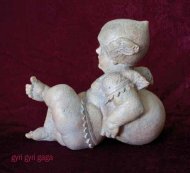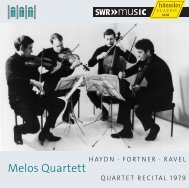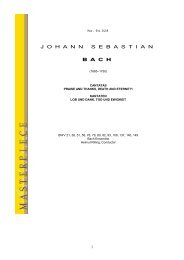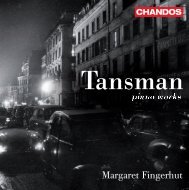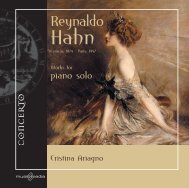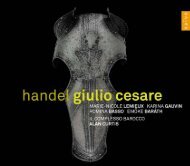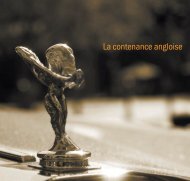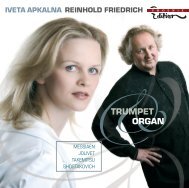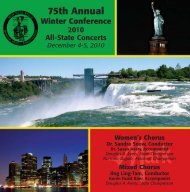Create successful ePaper yourself
Turn your PDF publications into a flip-book with our unique Google optimized e-Paper software.
Else Brems's interest in sacred music also embraced<br />
the rich fund of Danish hymns. She was herself a<br />
practicing Christian, md was often asked to sing Danish<br />
hymns at the many recitals she gave in churchesi the<br />
hymns recorded here demonstrate clearly whyl her<br />
inlerpretations had something mysterious. some<br />
inexplicable element in them. The theatre director John<br />
Price used to say that she had a direct line to God<br />
Almighty ! On the death ofQueenAlexandrine in I 952,<br />
she was asked by Radio Denmark to sing the beautiful<br />
"In Still Silence Man Must Tmy" by Hans Adolph<br />
Brorson, the finest poet of the Danish Evangelical<br />
movement. This song, set to music by the Romantic<br />
composer A.PBerggreen, was recorded and very soon<br />
became a classic (II,20). Else Brems held a prominent<br />
position in Danish musical life, and consequently was<br />
asked to perfom at public events and at many chmity<br />
mangements, not least in connection with Christmas<br />
festivities. As a souvenir of one such occasion we<br />
include here N.F.S.Grundtvig's and Berggreen's "Hail<br />
Welcome Again God's Angels Small", to the stately<br />
accompaniment of the Koppel String Quanet (II,21).<br />
The musicologist Karl Clausen, who has worked<br />
extensively on the subject ofthe Danish song, collected<br />
and edited a series of texts by Brorson set to popular<br />
tunes and recorded on tape by people for whom they<br />
were part of their spiritual inheritance. Some of these<br />
were recorded by Radio Denmmk, sung by Else Brems.<br />
By fimly shutting out the operatic resources of her<br />
voice she succeeds in penetrating into the very being<br />
of these simple songs which have caught their inspiration<br />
from The Song of Songs (II,22&23). Despite the<br />
highly praised nobility ofher bearing, Else Brems had<br />
a streak of unassuming homeliness in her character.<br />
This finds expression in the simple stanzaic ballads and<br />
songs which were recorded by Radio Denmrk as goodnight<br />
songs in the 50s. Thanks to a private Else Brems-<br />
enthusiast. we possess some fine recordings of these<br />
songs, the most well-known of which is the folk song<br />
about unrequited love "Once on a Saturday Evening".<br />
"How can one gather roses where roses will not grow"<br />
has become almost proverbial (II,24).Also included here<br />
is an interpretation of a Carl Nielsen evening song "l<br />
Go to Sleep without a Feil", presumably the only one<br />
which has withstood the ravages of time (II,25). The<br />
"Quiet Hearl the Sun Goes Down" is from the collection<br />
of Carl Nielsen and Thomas Laub songs performed for<br />
the first time by Else Brems's father. The simplicity and<br />
genuine feeling of this text by the Jutland poet Jeppe<br />
Aakjer here find supreme expression (II,26). This musical<br />
portrait of Else Brems is rounded off by the lTthcentury,<br />
anonymous night watchmm's verses (II,27).<br />
Else Brems, The Artist.<br />
The good fairies had endowed her in her cradle with<br />
musicality, a fine voice, beauty, imagination, and temperament.<br />
She possessed the aura which emanates tiom<br />
the great artist, and she became the most celebrated<br />
Danish mezzo-soprano of the 20th century. As a private<br />
person she was modest, almost self-effacing. Her<br />
working life was characterized by humility, and an<br />
unflagging striving towilds artistic perfection. She was<br />
loved and respected by her colleagues.<br />
Her voice was a well-focused, smooth, lyrical mezzo<br />
with a special timbre ofits own, but its range was never<br />
tully developed despite her very thorough training. The<br />
reason for this may perhaps be looked for in her rather<br />
introvert personality which did not accord with the<br />
extroverl "here-I-am" attitude. often connected with the<br />
extremely high registel Thus the grild mezzo parts in<br />
Verdi, Wagner, and Strauss were outside her domain,<br />
which is evident from her recording of a duet from 1l<br />
Trovatore with Stefan Islandi. Her voice had a soft,<br />
lyrical timbre, and she wisely refrained from tackling



